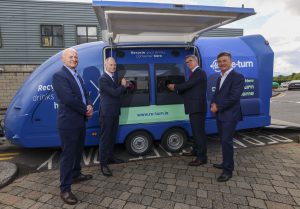Getting to grips with the DRS scheme

Sean Murphy, LPP, collections partner for Re-turn, Ossian Smyth TD, Tony Keohane, chair of Re-turn and Séamus Clancy, acting CEO, Re-turn using a reverse vending machine
How will the DRS scheme and what are the main benefits of the DRS scheme?
Under the Single Use Plastics (SUP) Directive, Ireland must ensure the separate collection of 77% of plastic beverage bottles placed on the market by 2025, rising to 90% in 2029. The Deposit Return Scheme (DRS) being introduced in Ireland is a very practical circular economy initiative, focused on increasing recycling of PET plastic bottles and aluminium cans. From 1 February 2024, when consumers purchase a drink in a PET plastic bottle or aluminium steel can (from 150ml – 3 litres) with the Re-turn logo, they will be charged a small deposit, which will be fully refunded when they return the empty, undamaged container to any local shop or supermarket. The Deposit Return system is a very effective recovery system with the highest recovery rates of any other ERP, exceeding 90% in several European markets. More than 40 countries and regions have successfully introduced Deposit Return Schemes, with 13 in Europe and many more being implemented.! Deposit Return increases consumer environmental awareness and encourages consumers to return drinks containers by placing a value on these containers. It also contributes to the reduction of litter, particularly for beverage containers consumed ‘on-the-go’.
Are all producers and retailers legally obliged to register with Re-turn?
Yes. All producers and retailers who place and sell in scope [meaning those packaged in single use PET plastic bottles, aluminium & steel cans from 150-ml – 3 litres] products in the Republic of Ireland are legally obliged to register with Re-turn.
The deadline for the introduction of the DRS is 1 February 2024, less than six months from now. Is there a lot to do in terms of communication with the industry between now and then and how do you propose to do it?
The scheme is on track for the go-live date on 1 February 2024. Re-turn has engaged with all stakeholders since being confirmed as operators of the scheme in July of 2022 and continues to collaborate with producers and retailers on a range of ongoing workstreams including coordinating preparation required for supply chain systems and processes, product barcode preparation, retailer logistics, and communications to raise awareness among both participants in the scheme and consumers.
What is the plan for communication with the public?
Re-turn is launching a national consumer campaign starting in mid October 2023, and is working with all stakeholders to raise awareness of the scheme launch to the public on 1 February 2024.

The transition period will be challenging for small operators in particular. Will there be supports there to manage this transition?
Absolutely, we recognise the transition period might be challenging for some small operators as they adapt to the Deposit Return Scheme. Re-Turn is committed to providing robust support measures to help small operators successfully manage this transition and have been working with all stakeholders over the last year providing support and guidelines to help operators understand and comply with the DRS requirements. Additionally, smaller individual businesses / operators may be eligible to apply for a Take Back Exemption, which if granted, would mean that the retailer would have no obligation to take back empty and undamaged drinks containers on their premises. It is important to note that ALL retailers who sell ‘in scope’ [meaning those packaged in single-use PET plastic, metal or glass containers of 50ml – 3 litres] drinks containers are legally obliged to register with the scheme and can then apply for a Take Back exemption Furthermore, we want to emphasise that Re-Turn is dedicated to ensuring a level playing field for all operators, regardless of their size. We are committed to providing a supportive environment that enables small operators to thrive within the DRS framework.
Who will be responsible for collecting and separating cans in off-trade/on-trade situation and who collects them from the outlet concerned?
Anyone who places or sells in scope products on the market in the Republic of Ireland have a legal responsibility to register with the Re-turn. Off-trade will have an automatic exemption from having a take back system and will be granted this on application. On-trade will have an exemption from having a take back obligation in certain circumstances but will have to apply for this exemption form Re-turn. In all circumstances where a take back system is provided by a retailer Re-turn will provide a collection system that will separate cans and plastic bottles.
Not being aligned on an all-Ireland scheme with Northern Ireland will bring challenges in terms of bar coding etc. Will this scheme require a separate can run for the domestic and international markets?
Re-turn is a national Deposit Return Scheme and all producers selling in scope containers on the ROI market are legally obliged to register with the scheme. The preference is for all producers to use an ROI specific barcode for the scheme, but producers may opt to use an international barcode, which is reflected in a higher producer fee, to cover the fraud risks involved.
The Scottish DRS has been sidelined. How do we avoid such a move happening here and is there an opportunity to futureproof ours in terms of handling fees, producer fees, contracts for collection etc. Is this adding a lot of administration work for independent traders and what do you expect will be their reaction to it?
We have had great support to date from all those retailers and producers and we do appreciate that there is additional administration involved in introducing this circular economy initiative. As a not-for-profit Extended Producer Responsibility Scheme, it is important that we keep both costs and administration to a minimum. The handling fees are given to retailers to offset the costs involved in deposit return and we have also introduced financial supports for smaller retailers who purchase RVMs with returns under 250,00 per annum. All information for retailers may be viewed at https://re-turn.ie/retailer/
Could there be unintended commercial impacts in that if the DRS is too onerous for some suppliers it may reduce the number of SKUs they put on the market in Ireland?
We have engaged extensively with producers since September 2022 to ensure that preparation and changes to SKUs may be made with minimal impact.
It’s understood that the move requires that a specific logo and price will have to be put on every can of alcoholic, non-alcoholic or soft drink product sold in Ireland. How long will producers have to introduce the new packaging?
Re-Turn has been working closely with producers and retailers to inform them of the labelling specifications for bottles and cans. These specifications were communicated to producers and retailers since November 2022 to ensure a smooth transition to the new packaging requirements. With the Deposit and Re-Turn scheme set to go live on 1 February, 2024, producers and retailers will have a grace period to ensure all bottles and cans comply with the correct labelling standards-from 16 March 2024 producers will no longer be able to sell non Re-turn stock and from 1 June 2024 retailers must only sell Re-turn stock. This transitional period will allow businesses to phase out any existing inventory of beverage containers that do not bear the required logo and price information.
Who supplies the reverse vending machines and what is the average cost?
A list of approved RVM suppliers is listed on the Re-turn website. www.return.ie. RVM machine prices vary significantly based on volume acceptance requirements. We would suggest contacting any of the suppliers on the website for specific requirements.
If outlets do not have space for a reverse vending machine, what is the alternative?
Retailers may opt for either manual return or for automatic collection, through Reverse Vending Machines (RVMs). Retailers have the choice of whether they opt for a reverse vending machine or not. It is not compulsory for any retailer to have a reverse vending machine. There are also exemptions available for retailers. These exemptions are primarily aimed at minimising the impact of the DRS on smaller retailers. These exemptions are granted by Re-turn, subject to certain conditions and the display of notices informing consumers about the nearest return points.
Will reverse vending machines create footfall drivers for the business?
Evidence would suggest from other countries that there is a potential increase in footfall for retailers that have a take back system available to consumers. The key for all retailers is that they are ready for ‘Go Live’ to protect their current footfall.








